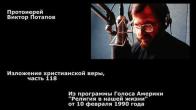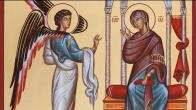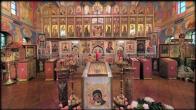You are here
Remember the Sabbath day, to keep it holy...
Remember the Sabbath day, to keep it holy. Six days shalt thou labor and do all thy work: but the seventh day is the Sabbath of the Lord thy God.
Our main concern must be to follow the path toward God, away from Whom we can find no rest. The Old Testament Sabbath was the image of God's resting after His creation of the world. It was also the image of His internal divine life, and the image of the higher spiritual, contemplative life of man, which the Sabbath rest summons to and schools us in. The Lord's day is Sunday: the Christian's day of prayer, a day for learning God's Word, and a day for Communion in the Eucharist, a day as well for good and charitable deeds.
Christ demonstrated the inseparability of love for God and love for man by healing the sick on God's day, on the Sabbath. The foremost sign of our undivided love for God and fellow man is our Sabbath participation in the Eucharist, in the mystery of Holy Communion, which grants us the strength to do good. Therefore, all Sundays and feast days see the Liturgy done in churches.
Each person must take part in the like of the Church just as each person is social, and takes part in the life of other persons in familial, communal, and civil life. Fulfillment of most social obligations take place in the world, but the obligations of Church life involve communion with God and service to Him. According to the unerring word of the Savior, if two or three are gathered together in His name, He is there in the midst of them. Common prayer in church makes individual prayer easier when alone because the Holy Spirit and the unison prayers of other people intensify the power of individual prayer in church. According to the teaching of the Church, the prayers of the angels and the saints are joined to the prayers of the faithful standing in church. One hymn of the Church speaks of this: Now the powers of heaven invisibly serve with us.
Certain people call themselves Aspiritual Christians and vainly insist that the Church is unnecessary, that they have a temple in their souls. They forget that God Himself, through His prophets Moses, David, and Solomon instituted the temple and the divine. The Old Testament tabernacle--a moveable temple--was built according to a plan shown by God to Moses. Let us recall the moving prayer of King Solomon: O Lord God of Israel, there is no God like thee, in heaven above, or on earth beneath . . . Behold, the heaven and heaven of heavens cannot contain thee; how much less this house that I have builded? Yet have thou respect unto the prayer of thy servant, and to his supplication, O Lord my God, to hearken unto the cry and to the prayer, which thy servant prayeth before thee today: that thine eyes may be open toward this house night and day, even toward the place of which thou hast said, My name shall be there: that thou mayest hearken unto the prayer which thy servant shall make toward this place. And hearken thou to the supplication of thy servant, and of thy people Israel, which they shall pray toward this place: and hear thou in heaven thy dwelling place: and when thou hearest, forgive (I Kings 8:23, 27-30).
Christ Himself visited the temple in Jerusalem, kept the Law and the feasts, and loved to read in the synagogues. The Mother of God was brought up at the temple in Jerusalem. The apostles gathered together in the upper room on Zion to pray and to perform the Holy Eucharist. The earliest Christians came together for common prayer in the catacombs.
In his diary My Life in Christ, the holy and righteous John of Kronstadt wrote about prayer in church. Here is just one fragment:
"Here in church is the one thing needful; here is a refuge from vanity and the storms of life; here is the calm harbor for souls seeking salvation; here is incorrupt food and drink for souls; here is the light, which enlightens every man who comes into the world; here is pure spiritual air; here is the well of living water springing up into everlasting life (John 4:14); here the gifts of the Holy Spirit are distributed; here is the cleansing of souls. The reading and singing in church, continues the righteous man of Kronstadt, are performed in a sacred language; all Orthodox Christians must learn it, in order to comprehend the sweet sayings of their mother, who is preparing her children for heaven, for eternal life . . . . Here in church, a man will come to know the true nobility of his soul, the value of life and its aim or his assigned path; here he dispels the fascination of worldly vanity and worldly passions by acquiring sobriety in his soul; here he comes to know his destiny, both temporal and eternal; here he comes to know his bitter, profound fall and seduction by sin; here the Savior is to be found, ;particularly in His holy and life, creating Mysteries, and His salvation; here a man comes to know his true relationship with God and his neighbor or with his family and the society in which he lives. The church is an earthly heaven, the place where the closest union with the Divinity occurs; it is a heavenly school which prepares Christians for heavenly citizenship, teaching them about the ways of heaven, about the dwellings of heaven; it is the threshold of heaven; it is the place for common prayer, for thanksgiving, for glorifying the Triune God, Who created and preserves everything; it is unity with the angels. What is more precious and more honorable that the church? Nothing. During the divine service, as on a chart, the whole destiny of the human race is depicted, from beginning to end. The divine service is the alpha and omega of the destiny of the world and of men."
[Quoted from Thoughts About the Divine Service of the Orthodox Church (Jordanville NY: Holy Trinity Monastery, 1954)]
According to the teaching of Saint Paul, Christians are to be living temples of the Living God (I Corinthians 6:19). God must dominate their feelings, thoughts, and desires. The Christian soul can become a living temple of God only by drawing nearer to the holy atmosphere of the Church, which is our refuge from the filth of the world and from the inclement storms of life. The soul was created for heaven. It is straitened and sorrowful on earth. During its best moments of spiritual exaltation, the soul yearns for the Heavenly Fatherland the songs of the earth do not satisfy the soul, as was well said by Lermontov:
At length, in the world she languished,
Filled with wondrous desire,
And the sounds of heaven could not be replaced for her
By the tedious songs of the earth.
If we are attentive to it, the divine service tears the soul away from the earth. Only in heaven can we hear something more beautiful than our Liturgy.
Professor Svetlov, the Russian theologian-apologist, gave explains the powerful psychological action of the divine service on the soul:
"In the rite, in the divine service, created by the faith and spirit of millions of believing people, there have been crystallized, so to speak, that faith and power of divine knowledge by which the rites and divine service were created. The divine service is the radiant robe of Christ, toward which every one looking for healing is drawn. In the divine service there is a hidden internal power. According to the teaching of physics there exist various types of batteries, which preserve hidden power, which at the proper time is revealed and acts. Such batteries in the natural world are, for example, electrical batteries, which store electrical energy. All that has been established by the creativity of the Church can be called just such a battery of spiritual energy, of power and faith. In the Church's centuries, old creation, has been crystallized and concealed by that effort of faith, prayer and love by which the people lived. It was in this experience of the life of the Church that everything in the Church was worked out. It is understandable that each contact with this condenser produces a spark, and frequent contact can generate a flame, igniting anew the lamp of the spirit and of living faith hidden under ashes. And faith arises!"
To pray in church is different from praying at home. Here is what John Chrysostom says:
"They say: We can pray at home. Thou art deceiving thyself, O man! Of course, one can pray at home. But it is impossible to pray there as in church, where such a multitude of hearts are uplifted to God, merging into one unanimous cry. Thou wilt not be so quickly heard while praying to the Master by thyself, as when praying together with thy brethren, for here in church there is something greater than in thy room: Agreement, unanimity, the bond of love, and finally here are the prayers of the priests. The priests stand before us, then, so that the prayers of the people, being weak, would be united to their more powerful prayers and together with them ascend to heaven. The Apostle Peter was freed from prison, thanks to the common prayers offered for him. (.....) If the Church's prayer was so beneficial for the Apostle Peter and delivered such a pillar of the faith from prison, why, tell me, dost thou disdain its power and what kind of justification canst thou have for this. Hearken unto God Himself, Who says that the multitude of people who pray to him with fervor moves Him to have mercy. He says to the Prophet Jonah: 'Shall I not spare Nineveh, that great city, in which dwell more than 120 thousand people.' He did not simply mention the multitude of people but that thou mightest know that prayer together has great power."
The Church is the only form of Christian fellowship. To be with Christ means to belong to His Church. The human soul cannot remain alone, apart from the souls of its neighbors. In church, especially at the moment of common unity at the Holy Chalice, we clearly feel the Lord and His truth and righteousness. And we cannot even imagine how great this power was in the meetings of Christians during the early centuries, when in the dark catacombs or in prisons or on the breast of a martyr (the Hieromartyr Lukian of Antioch, for example) when the Mystery of Unity, the Holy Eucharist was performed.
The Church of Christ is a union of those being saved, who dwell on earth, and of those righteous ones who have attained perfection. Both the Church militant and the Church triumphant have Jesus Christ as their common Head. Sanctified and strengthened by the Holy Spirit, they both make up His one mystical body, the One Church. The grace of God dwells in the Church, which directs Her children to salvation. Only to Her, to the one Church, is given the promise that the gates of hell shall not prevail against Her (Matthew 16:18). Christianity is not abstractable teaching, studied alone by each person. Christianity is a common life, best known in divine service, during common prayer in church, especially on Sunday, the Lord's day.
Those who oppose public ceremony may cite Christ's words in His Gospel conversation with the Samaritan woman: God is a Spirit, and they that worship Him must worship Him in spirit and in truth (John 4:24). But here the Savior is clearly saying that to please God and to worship Him are not matters of place, that worship is possible everywhere, in Jerusalem as the Jews taught, and on Mount Gerizim as the Samaritans taught. The New Testament Sacrifice, the Holy Mystery of the Eucharist, can occur everywhere. The Lord says that the worship of God must bear a spiritual character rather than occur only in a specific place.
The Church calls the faithful to rituals of worship. Christ does not reject rituals. The Gospel shows that the Lord recognized the rites of the Old Testament Church and that He took part in them: His naming, circumcision, and presentation in the temple in Jerusalem on the fortieth day after birth (Luke 2:21-22). Further on in the Gospel, the Savior healed some lepers. He sent them to the priests to show that the rite of cleansing might be performed to satisfy the law of Moses. When Christ healed the man blind from birth, he made clay from spittle (mixed with dust from the earth), anointed the eyes of the blind man with the clay and commanded him to go wash in the pool of Siloam; Christ lifted up His eyes to heaven when he fed the 5,000 with the five loaves (Matthew 14:19). In the garden of Gethsemane before His passion, he bowed His knees and prayed (Luke 22:41) Christ sent forth His apostles to anoint people with oil and to heal them. During the days of the Old Testament Passover and on other great Jewish holidays, Christ undertook long pilgrimages with the apostles from Galilee to Jerusalem to perform the festal ceremonies. The Mystical Supper was also celebrated in accordance with Old Testament rites and customs. For celebrating the Mystery of Communion, He pointed at the bread and wine. Think not that I am come to destroy the law: I came not to destroy, but to fulfill. The law of Moses included so many rituals. And finally, as He ascended to heaven: He lifted up his hands, and blessed them. And it came to pass, while he blessed them, he was parted from them (Luke 24:50-51). The lifting up of hands is also a ritual. Christ loved so many rituals. By His own example, Christ established the Mystery of Baptism and the necessity to perform it through the rite of immersion in water. The Savior fasted strictly for 40 days in the desert, and so He sanctified the rite of fasting. He gave rules for prayer and set the model Lord's Prayer--Our Father. He laid His hands on the children that were brought to Him and blessed them (Matthew 19:15).
During His life on earth, a multitude of men and women surrounded Him. They awaited held and healing from Him. Others followed Him simply from the inclination of their loving hearts. They wanted to be closer to the Savior, to feel His presence close to themselves, to experience His Divinity. In a word, people thirsted for contact with the Living God, Who is near and tangible.
Church ritual drawing the living man nearer to the Living God. Church rituals are the outward signs of our immaterial relationship with the Living God. Dostoevsky wrote a remarkable parable about the growth of sectarian antiritualism in Russia during the last century:
They carry a vessel of very precious liquid; all fall down, all kiss and adore the vessel containing this precious life-giving fluid. And then, suddenly, people stand up and begin to cry: You blind! Why do you kiss the vessel? It is only the live-giving fluid contained in it that is precious; only the contents is precious and not the container; but you are kissing glass, simple glass; you adore the vessel and the glass, ascribing all the holiness to it, and you are forgetting about the precious fluid that it contains. You idol-worshipers! Throw away the vessel and break it. Adore only the life-giving fluid, and not the glass!
And the glass was broken, as we read further in Dostoevsky's parable, and the life-giving fluid, the precious contents, is poured out on the earth and disappears into the earth. They have broken the vessel and lost the liquid. What miserable, unhappy, benighted people! exclaims Dostoevsky as he ends his parable. As we already said, man is a psychophysical entity. If we experience love, we express it in an external manner, by a certain ritual of love, as when a mother kisses and caresses her child. The same is true in religion. If we believe abstractly in God, then ritual is unnecessary. If our God is the living, personal God, then we need rituals of faith. They express our love and desire to draw near to God.
©Archpriest Victor Potapov,
1991-1992
PARISH LIFE
Address of our Cathedral
Subscribe to our mailing list
While all the materials on this site are copyrighted, you may use them freely as long as you treat them
with respect and provide attribution on the Russian Orthodox Cathedral of St.John the Baptist of Washington DC.









